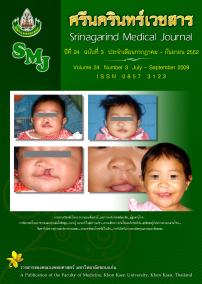ThaiScience
ThaiScience
SRINAGARIND MEDICAL JOURNAL
Volume 35, No. 04, Month JULY, Year 2020, Pages 438 - 444
How do the thai elders living alone in urban community plan for their health care a qualitative study in bangkok metropolitan region
Siriwan Jittapraneeraht, Saipin Hathirat, Chitima Boongird, Ruankwan Kanhasing
Abstract Download PDF
alone are increasing. The aims of this study was to explore healthcare plans and health needs of elders living alone in Bangkok metropolitan region. Methods: This was a qualitative study using the in-depth, semi-structured interview with purposive sampling was conducted among elders living alone in Bangkok metropolitan region who came to outpatient unit of the Department of Family Medicine, Ramathibodi Hospital. A sample of 20 patients complying with the inclusion criteria were recruited and interviewed. Data was analyzed using content analysis. Results: All participants likely planned for an independent living. Regarding the general health care, all of them emphasized on health promotion and disease prevention and had self-discipline in treatment of chronic illnesses. They consulted doctors immediately or took self-medication as soon as they had acute minor illnesses. They used their networks and resources which were prepared in advance as an emergency care plan. In terms of serious illnesses, they planned to move to live with others, nursing home or suicide. Most elders thought about death and prepared for their end of life. Half of them already had the funeral plans whilst some elders decided to donate their corpses for medical education. The health needs of the elders included a free health insurance, a health education, geriatric medical services, a call center or geriatric care centers in community, a geriatric home care, a funeral fund and adequate long-term care facilities. Conclusion: As an independent living was a crucial issue for elders living alone in urban setting, the elders likely to depend on themselves to handle their health issues as much as possible. They need the sufficient welfare and the public health system that could enhance their independent living, especially consultation system and medical support services
Keywords
elders elders living alone health care plan planningSRINAGARIND MEDICAL JOURNAL
Published by : Faculty of Medicine, Khon Kaen University
Contributions welcome at : http://www.smj.ejnal.com/e-journal/journal/index.php
